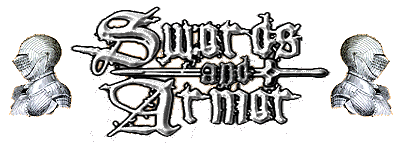
Medieval Shields and Crests

Medieval Battle and Hanging Display Shields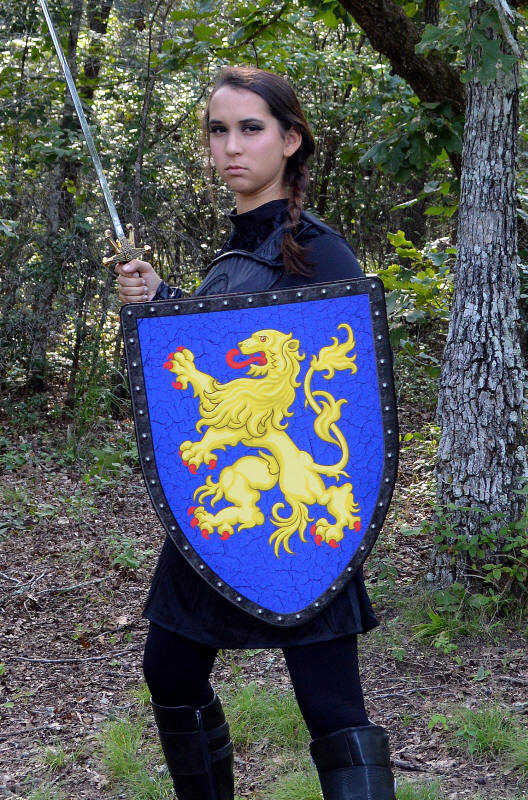 |
||
|
Everything you see is available as a hand held battle shield or a hanging display shield. The all of the pieces in the shield line shown below are manufactured in our US-based partner factory from a combination of hand painted original and digital graphic images. Want your dollars to mean more ? Buy American ... All the items on this page are hand made in the USA. They are Available as a Hanging Shield or as a Hand-Held, Battle Ready Version with Leather Straps. |
||
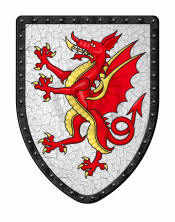 Tudor Dragon |
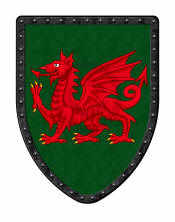 Red Dragon on Green |
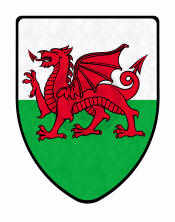 Tudor Dragon |
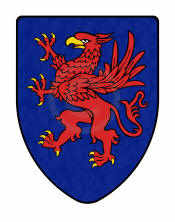 Gryphon on Blue |
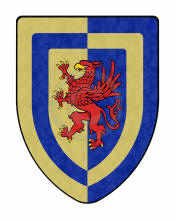 Griffin on Split Field |
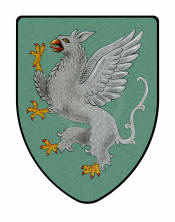 Griffon on Teal |
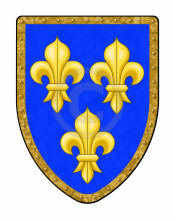 3 Fleur de Lis |
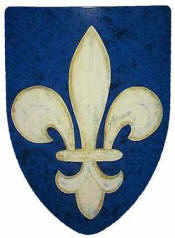 Fleur-de-Lis |
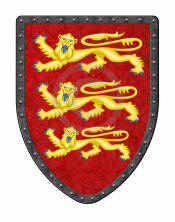 Richard Lionheart |
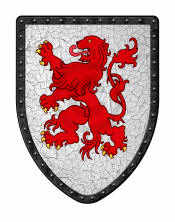 Red Lion |
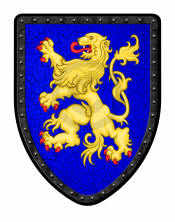 Rampant Lion on Blue |
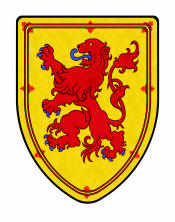 Scotland Lion |
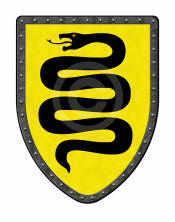 Snake on Yellow |
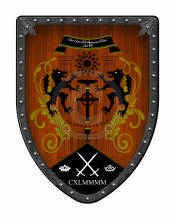 "Truth" |
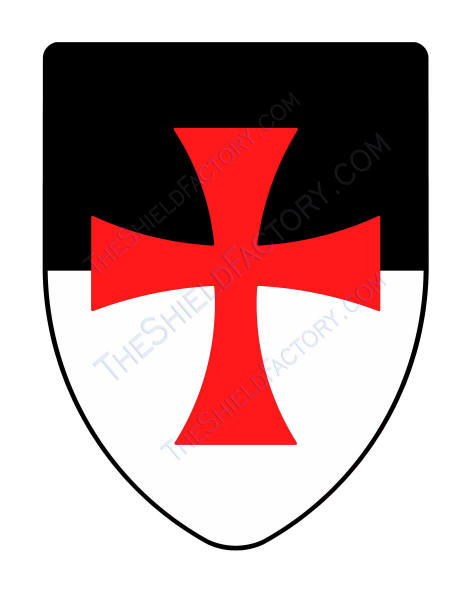 Templar on Black and White |
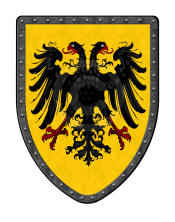 Double Eagle |
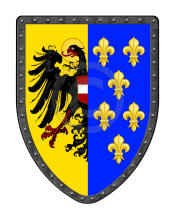 Charlemagne |
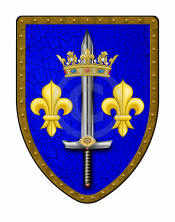 Joan of Arc |
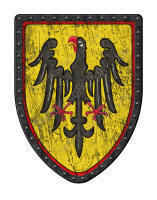 Ancient Eagle |
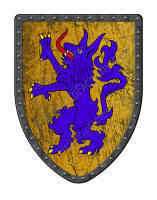 Alphyn |
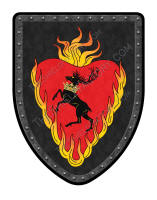 Flaming Heart Stag |
Medieval Shields For Your Wall or Battle Re-Enactment |
||
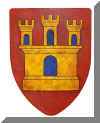 Castle |
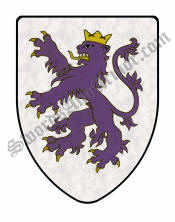 Rampant Lion - Purple |
 Germanic |
 Plain Shield |
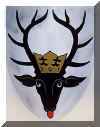 Stag |
 Boars |
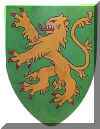 Rampant Lion - Green |
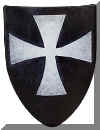 Hospitaller Knights |
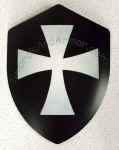 Hospitaller |
Custom Family Crests and Shields |
||
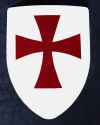 Templar |
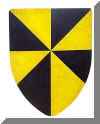 Campbell |
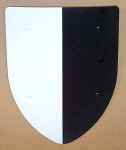 Harlequin |
 Lion Shield |
|
|
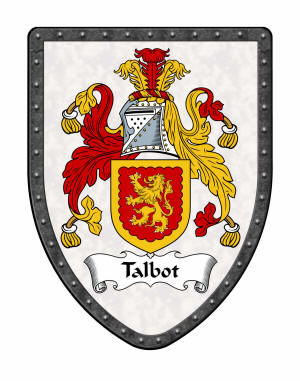
Family Coat Of Arms and Crests
Don't See What You Want !
We Can Custom Make You A Shield Of Your Own Design.
Medieval Shields and Family Crests
The Early Credentials of the Middle Ages
We think of medieval times and
the colors and pageantry of that age appear before us- the glorious shields
displayed in battle, the painted banners rising in victory and the women, beautifully
dressed bestowing their tokens on their favorite knights. Pomp and Circumstance
dictated the most meticulous detail for proper order and identification, and
the art of the Coat of Arms given for a Knight’s bravery and use of symbols
for group identification, such as a town’s symbol were born. This has
now evolved into the modern term used for family identification or the Family
Crest.
Even though we credit this to the medieval time period
as the beginning of this vibrant method to know who is who and what belongs
to whom, it actually started centuries prior to that age. Seals are as old as
writing, certain symbols standing for kings, temples and merchants, found in
the Egyptian ruins and could be dated back even further into more ancient civilizations.
Since most individuals did not read or write, a symbol was the easiest method
to proclaim the identity of the bearer or township, castle or land. This continued
to be true until widespread literacy began and that was not until the end of
the 19th century. Until that time, people relied on heraldry to tell them who
was standing in front of them or what kind of shop they were about to enter.
The semantics of heraldry started simply with lines and
shapes painted different colors to acknowledge the bearers but eventually developed
into a very complex language. The College of Arms in England was established
to record the various awarded collection through the centuries of English history
and it is a good place to see the progression from the simplest designs, Rollo,
first duke of Normandy with his Lion of Normandy (one lion- now the symbol of
Scotland) to Richard the Lionheart’s three passant Lions (the original
duke’s grandson indicating three generations) to the incredibly complex
stories told in the shields of the 17th century with their flourishes and deceptively
beautiful patterns that are actually telling a story. Every line, every dot,
every symbol has meaning and through that meaning, the meritorious deed of the
knight to whom it was awarded is told. For instance, wavy lines could represent
a sea battle while a baronet’s crown would indicate a noble birth or a
reward given for the accomplished deed (depending on the era).
Early Medieval Shields usually displayed very simple identification
marks consisting of lines and chevrons which, by their colors and their style,
proclaim which battle lord the troops belonged. Early Germanic leaders used
yellow and black, usually horizontal straight lines but the Medieval European
counterparts to English heraldry quickly caught on until the whole of Europe
danced with proprietary patterns and displays by the 17th century.
Today, some families still proudly possess a ‘family’
coat of arms which is actually a misnomer. No ‘family’ actually
was awarded a coat of arms. An ancestor of that family was given a coat of arms
for his role in a noble deed for his liege such as leading a successful battle
or a particular heroic act, along with a title and lands in the Norman tradition.
After the death of that individual, the heir in that family would claim the
coat of arms for themselves but each generation changed it to fit the personality
and deeds of the new owner. This is why it is so confusing when one goes hunting
for their particular family’s coat of arms. If a family had several heroic
generations that received royal attention, the Coat of Arms could change dramatically.
To complicate matters, now, when families cannot find a
Coat of Arms in their history, many are creating their own Family Crest, with
little understanding of what the symbols represent that they are using. Many
of these are being seen online and being taken for authentic Medieval Coat of
Arms. A Family Crest is not a Coat of Arms which is awarded. An unfortunate
occurrence is also happening, in which various sites that sell images of coat
of arms are also using any image that is available in order to satisfy their
customer. Many a family is now proudly displaying their Family Crest, which
was originally a sign hanging for an inn or a water stop in medieval times.
Hopefully, their family owned the inn.
|
Items Directly Below Are Round, Hand-Held Shields With Leather Straps on Back |
||
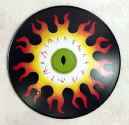 Flaming Eye |
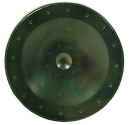 Round Buckler |
|
Shields Index Shields for Display
Swords and Armor Home Medieval Crests Replica Guns
Swords and Armor Specials !
New Introductions - Closeouts
- All Great Bargains
Shipping Policies and Rates - Returns
copyright © 2001-2015 swordsandarmor.com
. All Rights Reserved
privacy policy